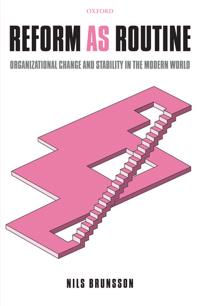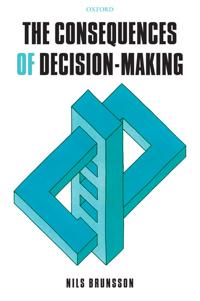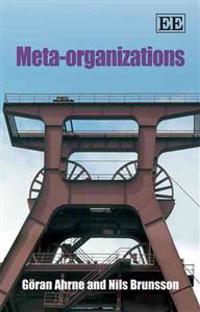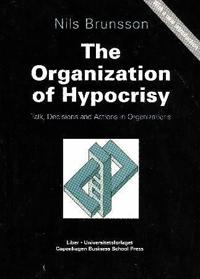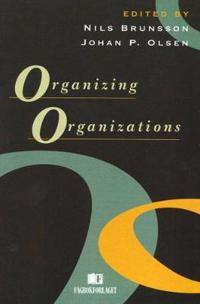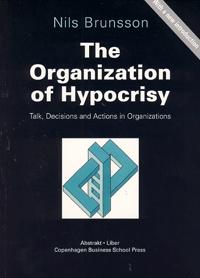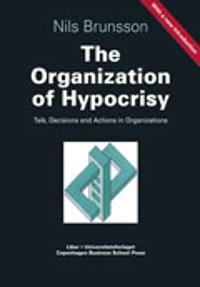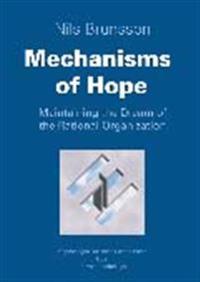BeGreppbart - Beslut (Häftad)
avKarin Brunsson, Nils Brunsson
ISBN: 9789147089406 - UTGIVEN: 2014-04-12Beslut
är en central aktivitet i organisationer. Inte minst i politiska sammanhang tillmäts beslut stor betydelse. Men att fatta beslut är också en vardaglig aktivitet, som alla människor är engagerade i. I den här boken reder Karin Brunsson och Nils Brunsson ut begreppet beslut. De beskr[...]Företagsekonomins frågor (Häftad)
avNils Brunsson, Johan Alvehus, Mats Alvesson, Björn Axelsson, Erik Bjurström, Bino Catasús, Karin Holmblad Brunsson, Håkan Håkansson
ISBN: 9789186203559 - UTGIVEN: 201005Företagsekonomins frågor kan användas som introduktion till företagsekonomistudierna, men den vänder sig också till alla andra som vill få en lättläst inblick i vad modern företagsekonomi handlar om.
Denna titel har tidigare givits ut av SNS förlag men ingår numera i Studentli[...]Reform as Routine (Inbunden)
avNils Brunsson
ISBN: 9780198296706 - UTGIVEN: 2009-07Large contemporary organizations seem to be in an almost continual state of change. Whether in public or private organizations, managers are trying to implement new organizational forms, introduce new procedures or systems, or change the attitudes of employees. Such reforms often yield disappointing[...]
The Consequences of Decision-making (Inbunden)
avNils Brunsson
ISBN: 9780199206285 - UTGIVEN: 2007-01Nils Brunsson is one of the leading European organization theorists who has written and researched decision-making in organizations. He has often questioned the rationality of decision-making, and argued that it is as important to understand other consequences of decision-making apart from choice - [...]
A World of Standards (Häftad)
avNils Brunsson, Bengt Jacobsson
ISBN: 9780199256952 - UTGIVEN: 200210In the modern world there is no shortage of people who know what is best for others. Self-appointed experts, consultants, and organizations try to convince states, corporations, and individuals that they would be better off if they only followed some specific rules about what to do. These rules are [...]
Meta-Organizations (Häftad)
avGoran Ahrne, Nils Brunsson
ISBN: 9781849808866 - UTGIVEN: 201101A growing number of organizations are meta-organizations; rather than individuals they have other organizations as their members. This comprehensive book explains, in-depth, the unique way in which meta-organizations function, how they differ from organizations with individual membership, and how th[...]
The organization of hypocrisy; talk, decisions and actions in organizations (Pocket)
avNils Brunsson
ISBN: 9788215011202 - UTGIVEN: 2006This book explores the ways in which organizations produce ideology and how the tension between ideology and action can actually benefit organizational legitimacy and survival. With index and references.[...]
Organizing Organizations (Inbunden)
avNils Brunsson
ISBN: 9788763000086 - UTGIVEN: 1998-12This book augments the many important Scandinavian contributions to our understanding of the organisational mosaic of society.[...]
The Organization of Hypocrisy (Häftad)
avNils Brunsson
ISBN: 9788763001069 - UTGIVEN: 2003-02Hypocrisy - the practice of incorporating different organizational structures, processes and ideologies for internal and external use - is an important feature of viable organizations in modern societies. It is an effective way of achieving organizational legitimacy in a world where organizations ar[...]
The Organization of Hypocrisy: Talk, Decisions and Actions in Organizations (Häftad)
avNils Brunsson
ISBN: 9789147065912 - UTGIVEN: 200301Hypocrisy â the practice of incorporating different organizational structures, processes and ideologies for internal and external use â is an important feature of viable organizations in modern societies. It is a natural and effective way of achieving organizational legitimacy in a world w[...]
Mechanisms of Hope: Maintaining the Dream of The Rational Organization (Häftad)
avNils Brunsson
ISBN: 9789147702008 - UTGIVEN: 200607Organizations cannot avoid deviating from the hierarchical-rational model - not only because it is in fact useful to do so, but also because it is vital for organizational survival in complex environments.
Läs mer
Organizations have traditionally been seen as hierarchical and rational.[...]Alla dessa marknader (Inbunden)
avJenny Björkman, Björn Fjaestad, Susanna Alexius, Catrin Andersson, Nils Brunsson, Magnus Erlandsson, , Lotta Björklund Larsen
ISBN: 9789170611421 - UTGIVEN: 2014-06-13Marknadens makt (Häftad)
avNils Brunsson
ISBN: 9789186203351 - UTGIVEN: 201002Ett bidrag till debatten om marknader och marknadslösningar liksom för högskoleutbildning om samhällets grundläggande institutioner i ekonomisk historia, företags- och nationalekonomi, sociologi och statskunskap.
Denna titel har tidigare givits ut av SNS förlag men ingår numera i [...]



